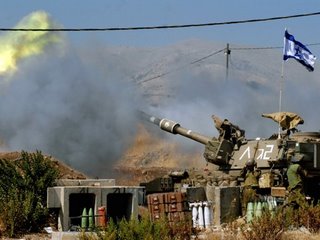
Veo en lo de Ramiro, un agente de la Mossad, esta muy interesante editorial del WSJ de hoy:
States of Terror
Israel's military invasion and naval blockade of Lebanon is being denounced in European capitals and at the United Nations as a "disproportionate" response to the kidnapping this week of two of its soldiers by Hezbollah. Israel's decision late last month to invade Gaza in retaliation for the kidnapping of another soldier by Hamas was also condemned as lacking in proportion. So here's a question for our global solons: Since hostage-taking is universally regarded as an act of war, what "proportionate" action do they propose for Israel?
In the case of Hamas, perhaps Israel could rain indiscriminate artillery fire on Gaza City, surely a proportionate response to the 800 rockets Hamas has fired at Israeli towns in the last year alone. In the case of Hezbollah, it might mean carpet bombing a section of south Beirut, another equally proportionate response to Hezbollah's attacks on civilian Jewish and Israeli targets in Buenos Aires in the early 1990s.
We aren't being serious, but neither is a feckless international community that refuses to proportionately denounce the outrages to which Israel is being subjected. That goes also for Secretary of State Condoleezza Rice, who says "all sides must act with restraint." But Israel's current problems result in part from an excess of restraint in responding to previous Hamas and Hezbollah provocations.
Now Israel is confronted with a war on two fronts with proxy terrorists armed and financed by Syria and Iran. Yesterday, medium-range Hezbollah rockets hit civilian targets across northern Israel. Any of those rockets might easily hit the port city of Haifa's oil refineries and chemical plants, causing horrific damage that would give Israel cause, and perhaps the self-preservation necessity, to strike Damascus and Tehran.
So far, Israel is limiting its military activities to Lebanon alone, out of the same abundance of restraint that has governed its behavior throughout the crisis. The democratic Lebanese government of Fouad Siniora bears its share of the blame, since it has failed to police its side of the border with Israel and failed to disarm Hezbollah, as required by Security Council Resolution 1559 and the 1989 Taif Accords that ended the Lebanese civil war. Senior Israeli military sources also claim that Lebanon tolerates the presence of hundreds of Iranian military personnel in Lebanon, again in violation of U.N. resolutions.
But Mr. Siniora's failings owe to weakness, not malfeasance, particularly in the face of Syria's continued meddling in Lebanese affairs following the departure of its army last year. A larger problem has been the failure of the Bush Administration to press Damascus harder when it had the opportunity to do so in the wake of last year's Cedar Revolution. The U.N. investigation into the murder of Lebanese Prime Minister Rafik Hariri, in which all evidence points to the involvement of senior associates and relatives of Syrian dictator Bashar Assad, seems to have disappeared in a black hole. Nor has the U.S. exacted any price for Syria's ongoing support for the insurgents in Iraq.
Critics of the Bush Administration will surely find a way to blame it for the current crisis, on the theory that this is what happens when you push for change in the Middle East. But the real problem is the growing perception among Arab regimes and terrorist frontmen that the U.S. is so bogged down in Iraq, and so suddenly deferential to the wishes of the "international community," that it has lost its appetite for serious reform. This has created openings for the kind of terror assaults on American allies we are now witnessing.
Israel can and will handle the immediate military threats on its two borders. But ultimately there will be no resolution in Lebanon and Gaza until the regimes in Syria and Iran believe they will pay a price for the wars they are waging through their proxies. The referral this week of Iran's nuclear file to the U.N. Security Council is a start, although we have little confidence it will lead anywhere. The White House has cited Syria and Iran as the culprits behind this week's events, but more forceful words and action are called for. The Middle East stands on the cusp of its worst crisis in a generation, and this is no time for formulaic statements calling for "restraint from both sides."

La religión de la paz.
ReplyDelete